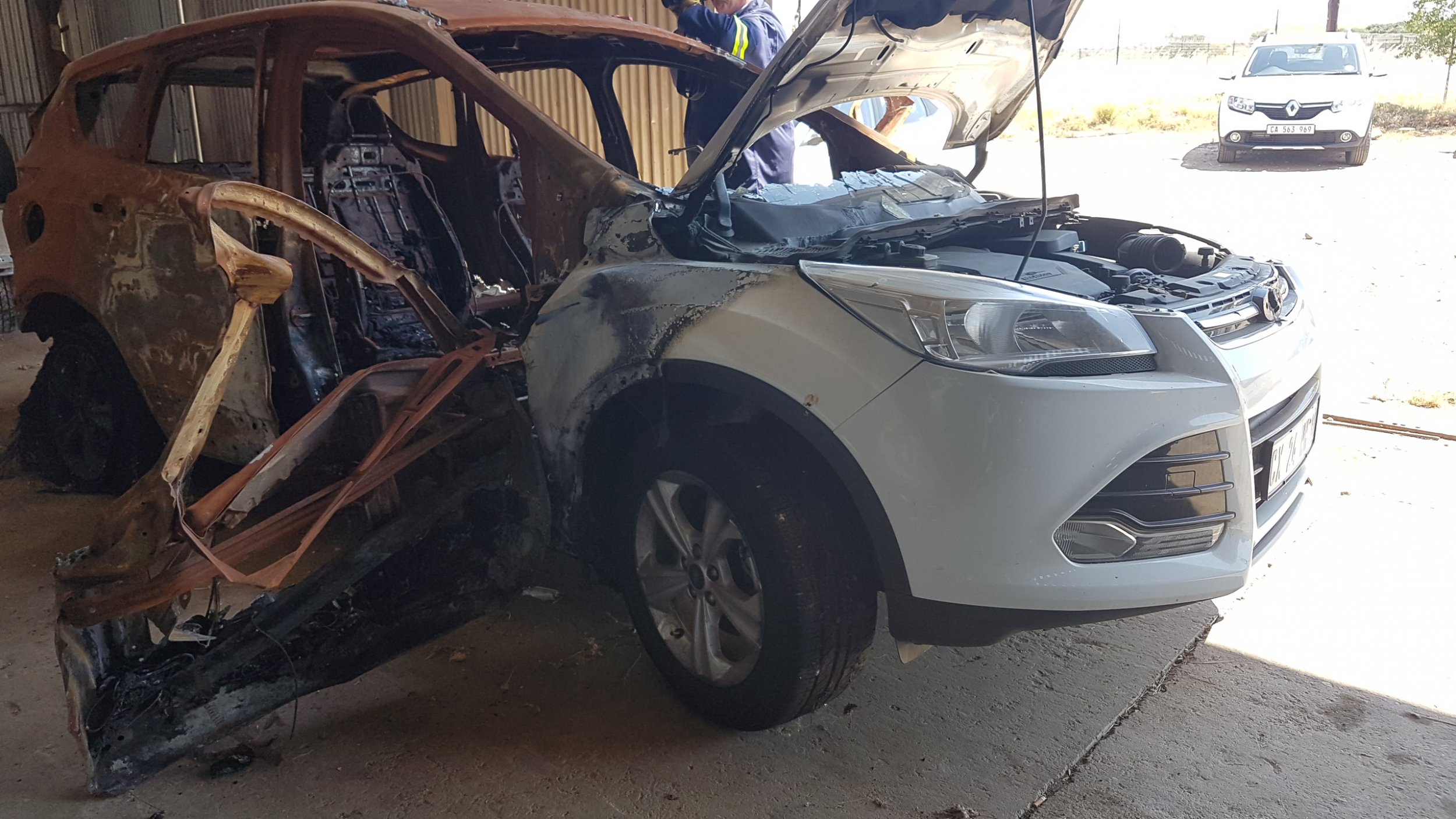
On December 4, 2015, Reshall Jimmy took a break from his digital marketing job and set off on a 700-mile drive from Johannesburg to George, a popular South African vacation spot. The 33-year-old had been planning to go skydiving and paragliding, says his younger sister Renisha, and Jimmy checked in with his family when he arrived; it was the last they heard from him. Four days later, police told the family that Jimmy was dead.
South African police said that Jimmy had died in a car fire. Renisha says the damage was so bad that forensic experts struggled to get a positive DNA match for her brother; the only parts of his body that weren't too badly burned were the soles of his feet. "It took us 13 days to get him home. [Even] the blood in his body had dried," says Renisha.
Since her brother's death, Renisha says she has been contacted by 51 Ford drivers of various models whose vehicles have also inexplicably caught fire. (The Facebook group she set up in the wake of her brother's death, titled "FORD Vehicles Burning," now has more than 133,000 likes.) On January 16, 2017, more than a year after Jimmy's death, Ford South Africa bowed to public pressure and issued a recall of more than 4,500 cars—all 1.6-liter Kugas manufactured in Spain between December 2012 and February 2014—that the company believes were affected by "an engine overheating condition that could cause a fire."
Ford tells Newsweek that it believes Jimmy's death is unrelated; the company says it doesn't know what killed him, but that it was something unconnected to the engine problem identified in the recall—leaving open the possibility of foul play. But after speaking with dozens of other affected Ford drivers, Renisha believes the company is not telling the truth about the cause of her brother's death, or the extent of the problems with several of their car models including the Ford Kuga.
As it awaits the conclusion of the inquest into Reshall's death, the Jimmy family is preparing two lawsuits against Ford. One is a class-action lawsuit on behalf of more than 80 drivers of various Ford models who have either experienced car fires or whose cars have diminished in value due to the scandal, and are seeking recompense for material loss (none of the other drivers were seriously injured). The other, pending the conclusion of the inquest, says the family's lawyer Rod Montano who is handling both cases, would be a civil action on behalf of the Jimmy family for Reshall's "wrongful death."
Following the January recall in South Africa—which only came after a public intervention by the country's consumer watchdog, the National Consumer Commission—Ford South Africa's chief executive Jeff Nemeth said in an interview with national station Radio 702 that the company had identified the same problem in all 39 of the Kuga fires reported to Ford by that point, none of which had resulted in injury or death.
According to Nemeth, the problem started under the bonnet, where an overheated engine prevented the car's coolant from keeping the engine at the correct temperature, causing its cylinder head to crack and allowing oil to leak and ignite when the liquid touched the hot engine. But Nemeth said that a Ford investigation had determined that this kind of engine compartment fire did not cause Jimmy's death. "We believe that that incident is a separate incident unrelated to these Kugas that were recalled," he said on Radio 702.
The Jimmy family agree that Reshall's death was not caused by the exact same engine flaw that Nemeth described, and that was identified in the recall. They say a separate electrical problem caused the fire in Jimmy's car, and possibly others, and that Ford should take responsibility for the car's other flaws.
The family says it has at least two forensic reports supporting its claim regarding Jimmy's death. A South African Police Service (SAPS) investigator carried out the first forensic analysis of Jimmy's car on December 16, 2015, less than two weeks after his death. In the SAPS report seen by Newsweek, the forensic investigator concluded that an electrical fire on the front passenger side of the car likely started the blaze. One month later, on January 20, 2016, three investigators—from the SAPS, Jimmy's motor insurance company, and an independent fire expert, Anthony Young, retained by Ford—drew the same conclusion in a report seen by Newsweek: the fire started at the front of the car, behind the dashboard on the passenger side, and was likely the result of an electrical problem.
But Ford appears to have disregarded the Young report's findings. Nearly a year after Young published his report, in December 2016, a Ford engineer, James Engle, flew to South Africa from the United States to investigate the car a second time. This time, Engle concluded that the fire started at the rear of the vehicle, not at the front passenger side, on the basis that the vehicle sustained greater damage in the back—the rear tires were melted, while the front ones remained intact, for example—and burn patterns indicated a progression of the blaze from the rear to the front, which would suggest that something other than the electrics under the dashboard started the fire. Engle disputed the initial finding of an electrical problem and concluded that the cause of the fire was "undetermined," now Ford's official line on what happened with Jimmy's car.

Nemeth said on South African television recently that Ford made "repeated requests for access," before it was able to examine Jimmy's vehicle in December 2016 after apparently denying that Young and others had analyzed the car 11 months earlier at Ford's behest. ( Newsweek contacted Young to ask if Ford offered feedback on his report, but received no reply. Ford also refused to comment on the contents of Young's report.)
David Klatzow, an independent forensic scientist who is analyzing the car on behalf of the Jimmy family, calls Engle's report "a piece of nonsense." He argues the damage to the rear of the Kuga is likely explained by the presence of a gas tank, which provided fuel for the fire to cause greater damage. In his opinion, Ford is ignoring reports that the fire could have been caused by electrical flaws to dodge liability. "It's much better for them...if they can pin that fire on an external cause," he says.
How and where the fire started is significant for two reasons. Firstly, if it was an electrical defect in the front of the car—as opposed to some undetermined, and possibly external, cause like foul play—Ford might be liable for Jimmy's death. Secondly, Renisha believes there are other problems with the Kuga beside the engine fault cited by Ford in the recall that caused her brother's fire and others."I've spoken to all of the fire victims. What they [Ford] are not saying publicly is that there are fires like Reshall's, there's a few people that had fires, like electrical fires, from inside of the car," she says. "It's not just engine fires, there are different problems that people are having."(Renisha told Newsweek her brother previously had electrical issues with his car; its engine, for example, started by itself on several occasions when the car was locked and turned off in his office's garage.)
Sean Thompson, a 49-year-old maintenance manager from Vanderbijlpark, tells Newsweek that his 2.5-liter Kuga, a different model than the one recalled, caught fire in August 2015, four months before Reshall's death. Thompson says that he received a call from a security service that looks after his car to warn him that the car battery was draining. When he returned to the garage, he found the car filled with smoke. "You couldn't get the doors open, you couldn't get the windows open, so obviously you would've suffocated in there," says Thompson. He says that Ford refused to repair the car or give a cause for the fire, which was identified by a local garage as an electrical wiring flaw. ( Newsweek contacted Ford regarding Thompson's case, but had received no comment by the time of publication.)

Aside from the pending litigation, other recent developments have put pressure on Ford: leaked video footage taken by a witness to Jimmy's fire clearly shows the blaze starting at the front of the car—as suggested in the SAPS and Young reports—and moving backwards. Meanwhile, two South African police officials have submitted affidavits to the Cape Town High Court, alleging that Ford broke the law by failing to inform the National Consumer Commission about Jimmy's death. The officers also claim the company obstructed their investigation by failing to produce the Young report when the SAPS requested it. (In its own court affidavit, Ford accused the Jimmy family of obstructing their investigations by failing to provide evidence, including the video footage.)
As for the video, Ford spokeswoman Rella Bernardes tells Newsweek its authenticity cannot be verified: "We cannot identify the vehicle, the location or the persons speaking. We will take time to formally and carefully review the vehicle," she says. Nevertheless, Bernardes adds, the video "does not change our findings" regarding the origin of the fire, which Ford maintains started at the rear of the vehicle.
In some instances, Ford's response to Jimmy's death also appears to have taken a darker turn. Another Kuga owner, Carlynne van Jaarsveld, says that when she brought her Kuga back to a Ford dealership in Durban, staff propagated a rumor that Jimmy had committed suicide. "I was shocked. I've also got a family, I wouldn't like it if someone says that," says van Jaarsveld, 32. Other Kuga drivers have reported similar suggestions from Ford staff at other dealerships when returning their cars. (Ford tells Newsweek that dealers have not been instructed to comment in any way on the Jimmy case.)
Renisha says that Ford owners concerned about their safety continue to contact her daily, and there are signs that the company may be suffering from the bad publicity. Only 74 Kugas were sold in South Africa in January—almost half the 146 units sold in the previous month, although Ford's total sales of all vehicles in the country actually showed a 1.7 percent increase compared to January 2016. The company's recall was limited to the 1.6-liter Kuga model built between December 2012 and February 2014, but there are reports of other Kuga models catching fire, some of which were allegedly caused by electrical problems. There have also been reports of Kugas spontaneously catching fire in Australia and New Zealand, though Ford has not carried a recall in either country.
Some have questioned why the recall took so long to be enacted in South Africa. Quartz reported that, in the United States, Ford recalled 400,000 of its Ford Escape—the U.S. equivalent to the Kuga—and Mercury Mariner models in October 2016 due to a fuel leakage problem before any fires were even reported. But Ford spokeswoman Bernardes says the two issues are unrelated. "Our decisions are driven by the data available in each market," she says. "The field data in the United States with the U.S.-built Escape and in the South African Kuga 1.6-liter vehicles are different."
For Renisha, the impending lawsuits against Ford feels like a turning point—a case of consumers uniting to fight back against a big company they accuse of negligence. "The class-action would give all of those people some form of closure that a big [corporation] can't just do this to a consumer and get away with it," she says.
Uncommon Knowledge
Newsweek is committed to challenging conventional wisdom and finding connections in the search for common ground.
Newsweek is committed to challenging conventional wisdom and finding connections in the search for common ground.
About the writer
Conor is a staff writer for Newsweek covering Africa, with a focus on Nigeria, security and conflict.
To read how Newsweek uses AI as a newsroom tool, Click here.








